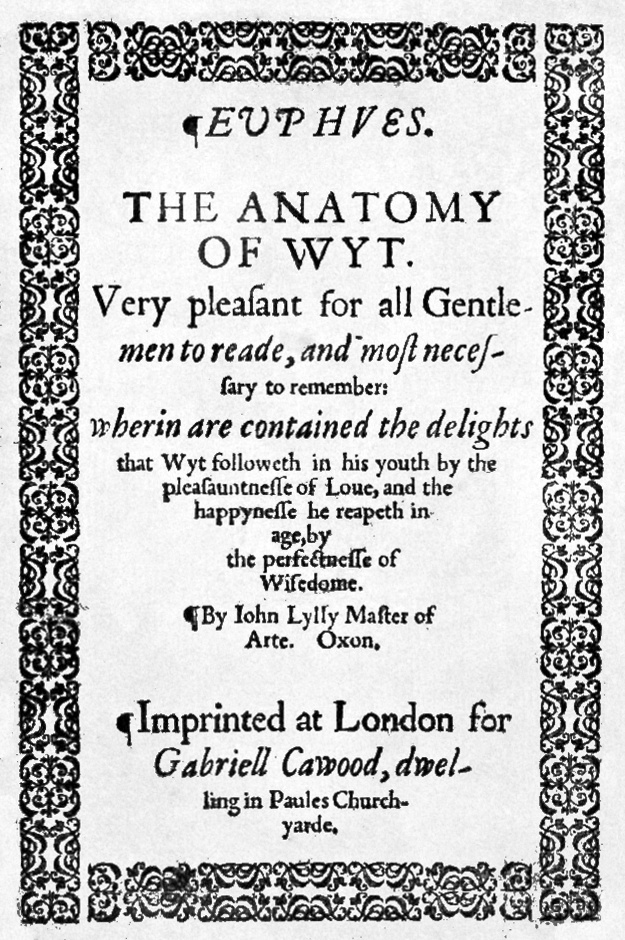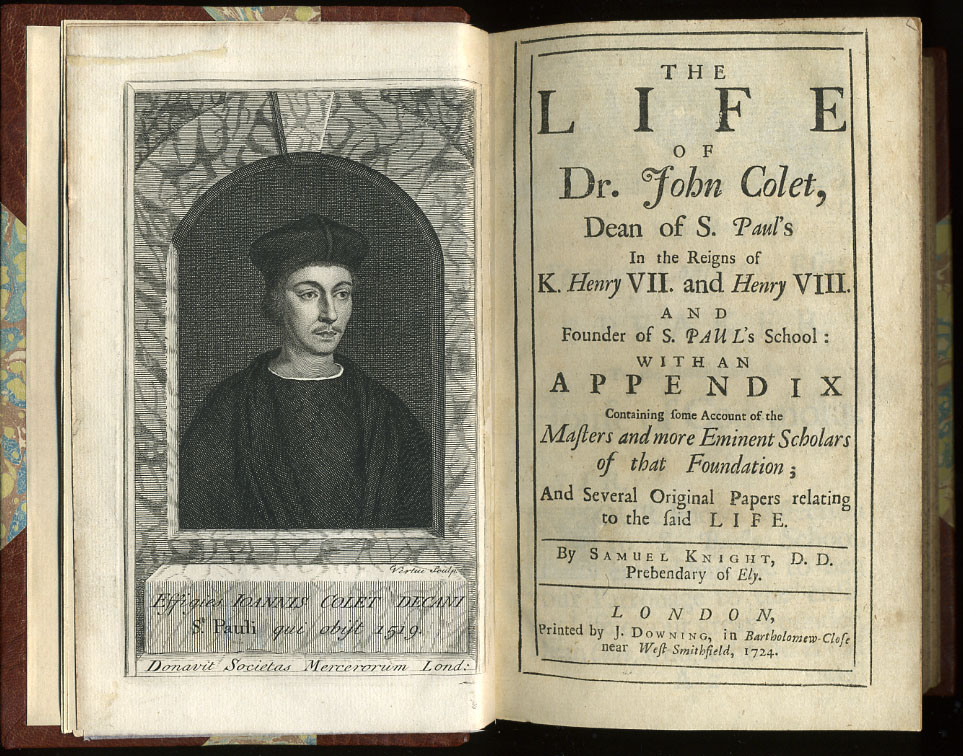|
John Lilly (writer)
John Lyly (; c. 1553 or 1554 – November 1606; also spelled ''Lilly'', ''Lylie'', ''Lylly'') was an English writer, dramatist of the University Wits, courtier, and parliamentarian. He was best known during his lifetime for his two books '' Euphues: The Anatomy of Wit'' (1578) and its sequel ''Euphues and His England'' (1580), but perhaps best remembered now for his plays. Lyly's distinctive and much imitated literary style, named after the title character of his two books, is known as ''euphuism''. Biography John Lyly was born in Kent, England, in 1553/1554, the eldest son of Peter Lyly and his wife, Jane Burgh (or Brough), of Burgh Hall in the North Riding of Yorkshire. He was probably born either in Rochester, where his father is recorded as a notary public in 1550, or in Canterbury, where his father was the Registrar for the Archbishop Matthew Parker and where the births of his siblings are recorded between 1562 and 1568. His grandfather was William Lily, the grammarian ... [...More Info...] [...Related Items...] OR: [Wikipedia] [Google] [Baidu] |
Sir Robert Cecil
Robert Cecil, 1st Earl of Salisbury, (1 June 156324 May 1612), was an English statesman noted for his direction of the government during the Union of the Crowns, as Tudor England gave way to Stuart rule (1603). Lord Salisbury served as the Secretary of State of England (1596–1612) and Lord High Treasurer (1608–1612), succeeding his father as Queen Elizabeth I's Lord Privy Seal and remaining in power during the first nine years of King James I's reign until his own death. The principal discoverer of the Gunpowder Plot of 1605, Robert Cecil remains a controversial historic figure as it is still debated at what point he first learned of the plot and to what extent he acted as an ''agent provocateur''. Early life and family Cecil (created Earl of Salisbury in 1605) was the younger son of William Cecil, 1st Baron Burghley by his second wife, Mildred Cooke, eldest daughter of Sir Anthony Cooke of Gidea, Essex. His elder half-brother was Thomas Cecil, 1st Earl of Exeter, and ... [...More Info...] [...Related Items...] OR: [Wikipedia] [Google] [Baidu] |
Love's Metamorphosis
''Love's Metamorphosis'' is an Elizabethan era stage play, an allegorical pastoral written by John Lyly. It was the last of his dramas to be printed. Performance and Publication ''Love's Metamorphosis'' was entered into the Stationers' Register on 25 November 1600, and was first published in 1601 in a quarto issued by the bookseller William Wood. The title page of the 1601 quarto calls the play a "witty and courtly pastoral," and states that it was first staged by the Children of Paul's, the troupe of child actors that was Lyly's regular company, and "now" (c. 1600) by the Children of the Chapel. "Probably the Paul's boys produced it c. 1589–90, and the Chapel revived it in 1600–1." ''Love's Metamorphosis'' was left out of ''Six Court Comedies'' ( 1632), the first collected edition of Lyly's plays; and there is no evidence that it was ever a "Court comedy," that it was ever acted at Court. The play was not reprinted until F. W. Fairholt's 1858 edition of Lyly's coll ... [...More Info...] [...Related Items...] OR: [Wikipedia] [Google] [Baidu] |
Oxford Dictionary Of National Biography
The ''Dictionary of National Biography'' (''DNB'') is a standard work of reference on notable figures from British history, published since 1885. The updated ''Oxford Dictionary of National Biography'' (''ODNB'') was published on 23 September 2004 in 60 volumes and online, with 50,113 biographical articles covering 54,922 lives. First series Hoping to emulate national biographical collections published elsewhere in Europe, such as the '' Allgemeine Deutsche Biographie'' (1875), in 1882 the publisher George Smith (1824–1901), of Smith, Elder & Co., planned a universal dictionary that would include biographical entries on individuals from world history. He approached Leslie Stephen, then editor of the ''Cornhill Magazine'', owned by Smith, to become the editor. Stephen persuaded Smith that the work should focus only on subjects from the United Kingdom and its present and former colonies. An early working title was the ''Biographia Britannica'', the name of an earlier eightee ... [...More Info...] [...Related Items...] OR: [Wikipedia] [Google] [Baidu] |
St Paul's School, London
(''By Faith and By Learning'') , established = , closed = , type = Independent school Public school , religion = Church of England , president = , head_label = High Master , head = Sally Anne Huang , r_head_label = Surmaster , r_head = Fran Clough , chair_label = Chairman of the Governors , chair = Johnny Robertson , founder = John Colet , specialist = , address = Lonsdale Road , city = Barnes , county = London , country = United Kingdom , postcode = SW13 9JT , local_authority = , urn = 102942 , ofsted = , staff = c. 110 , enrolment = c.950 , gender = Boys ... [...More Info...] [...Related Items...] OR: [Wikipedia] [Google] [Baidu] |
Matthew Parker
Matthew Parker (6 August 1504 – 17 May 1575) was an English bishop. He was the Archbishop of Canterbury in the Church of England from 1559 until his death in 1575. He was also an influential theologian and arguably the co-founder (with a previous Archbishop of Canterbury, Thomas Cranmer, and the theologian Richard Hooker) of a distinctive tradition of Anglican theological thought. Parker was one of the primary architects of the Thirty-nine Articles, the defining statements of Anglican doctrine. The Parker collection of early English manuscripts, including the book of St Augustine Gospels and "Version A" of the ''Anglo-Saxon Chronicle'', was created as part of his efforts to demonstrate that the English Church was historically independent of Rome, creating one of the world's most important collections of ancient manuscripts. Along with the pioneering scholar Lawrence Nowell, Parker's work concerning the Old English literature laid the foundation for Anglo-Saxon studies. ... [...More Info...] [...Related Items...] OR: [Wikipedia] [Google] [Baidu] |
Registrar
A registrar is an official keeper of records made in a register. The term may refer to: Education * Registrar (education), an official in an academic institution who handles student records * Registrar of the University of Oxford, one of the senior officials of the university. Government records * Registrar (law), the official in charge of a court registry, usually a judicial appointment * Registrar of Companies, India * Registrar general, government officer in Britain and Commonwealth nations concerned with civil registration * Registrar General's Department, the Government of Ghana agency responsible for the registration of companies and business * Registrar of the treasury, an office of the United States Treasury Department * County registrar, an official of the Irish Circuit Court who carries out quasi-judicial and administrative functions * Office of the Registrar of Indigenous Corporations, an Australian Government statutory office * Superintendent Registrar, the senior o ... [...More Info...] [...Related Items...] OR: [Wikipedia] [Google] [Baidu] |
Canterbury
Canterbury (, ) is a City status in the United Kingdom, cathedral city and UNESCO World Heritage Site, situated in the heart of the City of Canterbury local government district of Kent, England. It lies on the River Stour, Kent, River Stour. The Archbishop of Canterbury is the primate (bishop), primate of the Church of England and the worldwide Anglican Communion owing to the importance of Augustine of Canterbury, St Augustine, who served as the apostle to the Anglo-Saxon paganism, pagan Kingdom of Kent around the turn of the 7th century. The city's Canterbury Cathedral, cathedral became a major focus of Christian pilgrimage, pilgrimage following the 1170 Martyr of the Faith, martyrdom of Thomas Becket, although it had already been a well-trodden pilgrim destination since the murder of Ælfheah of Canterbury, St Alphege by the men of cnut, King Canute in 1012. A journey of pilgrims to Becket's shrine served as the narrative frame, frame for Geoffrey Chaucer's 14th-century Wes ... [...More Info...] [...Related Items...] OR: [Wikipedia] [Google] [Baidu] |
Rochester, Kent
Rochester ( ) is a town in the unitary authority of Medway, in Kent, England. It is at the lowest bridging point of the River Medway, about from London. The town forms a conurbation with neighbouring towns Chatham, Rainham, Strood and Gillingham. Rochester was a city until losing its status as one in 1998 following the forming of Medway and failing to protect its status as a city. There have been ongoing campaigns to reinstate the city status for Rochester. Rochester was for many years a favourite of Charles Dickens, who owned nearby Gads Hill Place, Higham, basing many of his novels on the area. The Diocese of Rochester, the second oldest in England, is centred on Rochester Cathedral and was responsible for founding a school, now ''The King's School'', in 604 AD, which is recognised as the second oldest continuously running school in the world. Rochester Castle, built by Bishop Gundulf of Rochester, has one of the best-preserved keeps in either England or France. During ... [...More Info...] [...Related Items...] OR: [Wikipedia] [Google] [Baidu] |
North Riding Of Yorkshire
The North Riding of Yorkshire is a subdivision of Yorkshire, England, alongside York, the East Riding and West Riding. The riding's highest point is at Mickle Fell with 2,585 ft (788 metres). From the Restoration it was used as a lieutenancy area, having been previously part of the Yorkshire lieutenancy. Each riding was treated as a county for many purposes, such as quarter sessions. An administrative county, based on the riding, was created with a county council in 1889 under the Local Government Act 1888. In 1974 both the administrative county and the North Riding of Yorkshire lieutenancy were abolished, replaced in most of the riding by the non-metropolitan county and lieutenancy of North Yorkshire. History Archives from 1808 record that the "north-riding of York-shire" had once consisted of "fifty-one lordships" owned by Robert the Bruce. During the English Civil War, the North Riding predominantly supported the royalist cause, while other areas of York ... [...More Info...] [...Related Items...] OR: [Wikipedia] [Google] [Baidu] |
Euphuism
Euphuism is a peculiar mannered style of English prose. It takes its name from a prose romance by John Lyly. It consists of a preciously ornate and sophisticated style, employing a deliberate excess of literary devices such as antitheses, alliterations, repetitions and rhetorical questions. Classical learning and remote knowledge of all kinds are displayed. Euphuism was fashionable in the 1580s, especially in the Elizabethan era, Elizabethan court. ''Euphues'' (1580) "Euphues" is the Greek for "graceful, witty". John Lyly published the works ''Euphues (1578), Euphues: The Anatomy of Wit'' (1578) and ''Euphues and his England'' (1580). Both works illustrated the intellectual fashions and favourite themes of Renaissance society—in a highly artificial and mannered style. The plots are unimportant, existing merely as structural elements on which to display conversations, discourses and letters mostly concerning the subject of love. Its essential features had already appeared in ... [...More Info...] [...Related Items...] OR: [Wikipedia] [Google] [Baidu] |
University Wits
The University Wits is a phrase used to name a group of late 16th-century English playwrights and pamphleteers who were educated at the universities (Oxford or Cambridge) and who became popular secular writers. Prominent members of this group were Christopher Marlowe, Robert Greene, and Thomas Nashe from Cambridge, and John Lyly, Thomas Lodge, and George Peele from Oxford. Thomas Kyd is also sometimes included in the group, though he was not from any of the aforementioned universities. This diverse and talented loose association of London writers and dramatists set the stage for the theatrical Renaissance of Elizabethan England. They are identified as among the earliest professional writers in English, and prepared the way for the writings of William Shakespeare, who was born just two months after Marlowe. Term The term "University Wits" was not used in their lifetime, but was coined by George Saintsbury, a 19th-century journalist and author.Sager, Jenny "Melnikoff, Ed., Robert ... [...More Info...] [...Related Items...] OR: [Wikipedia] [Google] [Baidu] |




.jpg)



